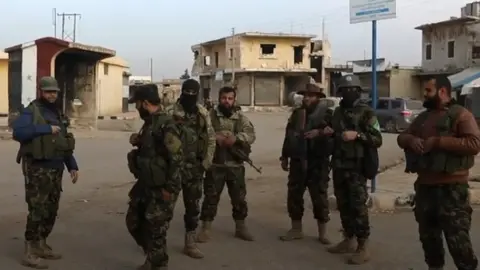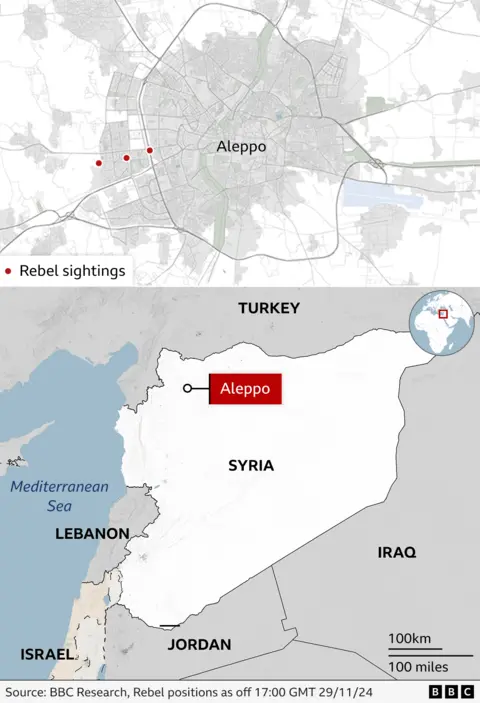Rebel forces in Syria have taken control of “half” of the country’s second-largest city, Aleppo, according to the UK-based monitoring group Syrian Observatory for Human Rights (SOHR).
SOHR said 277 people – including more than 20 civilians – have been killed since the offensive started on Wednesday.
The offensive is the largest against the Syrian government in years and the first time rebels fighting the forces of President Bashar al-Assad have reached Aleppo since being forced out by the army in 2016.
Aleppo’s airport and all roads leading into the city have been closed, military sources told Reuters news agency.
The rebels were able to capture “half of Aleppo” without meeting significant resistance, SOHR director Rami Abdel Rahman told AFP news agency early on Saturday.
There “has been no fighting, not a single shot was fired, as regime forces withdrew”, he added.
Earlier on Friday, government forces said they had regained positions in a number of towns in Aleppo and Idlib provinces, following the offensive launched by HTS and allied factions on Wednesday.
Video posted on a channel affiliated with the Islamist militant group Hayat Tahrir al-Sham (HTS) appears to show rebel fighters in vehicles inside the city.
BBC Verify has geolocated the footage to a western suburb of Aleppo.
More than half a million people have been killed in the civil war that erupted after the government cracked down on pro-democracy protests in 2011.
An array of armed groups opposed to the Assad government – including jihadists – took advantage of the turmoil to seize swathes of territory.
The Syrian government – with help from Russia and other allies – later retook most the areas it had lost.
Idlib, the last remaining opposition stronghold, is mostly controlled by HTS, but Turkish-backed rebel factions and Turkish forces are also based there.
Syrian and Russian planes carried out 23 air strikes near Idlib on Friday, according to SOHR.
The UK-based monitoring group, which uses a network of sources on the ground in Syria, said four civilians were killed and 19 others were injured in the Russian strikes.
Russia’s military said it had bombed “extremist forces”, according to Russian news agencies.
Kremlin spokesman Dmitry Peskov expressed his support for “the government of Syria to quickly restore order” and said the country’s sovereignty was under attack.

On Friday, a statement posted on a rebel-affiliated channel said: “Our forces have begun entering the city of Aleppo.”
Videos verified by the BBC show armed men running in a street about seven kilometres (4.3 miles) from Aleppo’s medieval citadel in the centre of the city.
Another clip verified by the BBC showed large groups of people carrying luggage walking away from an area near Aleppo University. That video was recorded 3km away from a location where HTS-affiliated media claim rebel forces have entered the city.
Aleppo resident Sarmad told AFP he could hear “the sounds of missiles and artillery shelling around the clock”.
“We’re scared that war will break out and we’ll be displaced from our homes again,” the 51-year-old said.
The UN’s deputy regional humanitarian co-ordinator for Syria, David Carden, said he was deeply alarmed by the impact of the escalating hostilities on civilians.
“Relentless attacks over the past three days have claimed the lives of at least 27 civilians, including children as young as eight years old”, he said.
Fighting in Idlib had largely wound down since 2020, when Turkey and Russia, Syria’s key ally, brokered a ceasefire to halt a push by the government to retake the province.
But on Wednesday HTS and its allies said they had launched their offensive to “deter aggression”, accusing the government and allied militias of escalation in the region.
It came as the Syrian government and its allies were preoccupied with other conflicts.
In neighbouring Lebanon, an Israeli military campaign has devastated the Iran-backed Hezbollah movement, whose fighters helped turned the tide of the Syrian civil war.
Israel has also stepped up its air strikes inside Syria on targets linked to Iran and Iran-backed groups.

Additional reporting by Lina Sinjab in Beirut and Richard Irvine-Brown, Merlyn Thomas and Paul Brown in London.

